
Reasonable Adjustments at Work for Employees with Disabilities and Health Conditions

Streamline Reasonable Adjustments: Documents & Templates for Every Business
Improve workplace support and enhance inclusivity effortlessly with our comprehensive range of reasonable adjustment products ready for digital download. Tailored for individuals with health conditions, impairments, disabilities, or neurodivergence, these products empower you to manage reasonable adjustments in your business seamlessly. Our documents and templates are intuitively designed for ease of use, featuring straightforward guidance. Pre-filled examples are also included to streamline the process.
Featured Reasonable Adjustments Products...
-
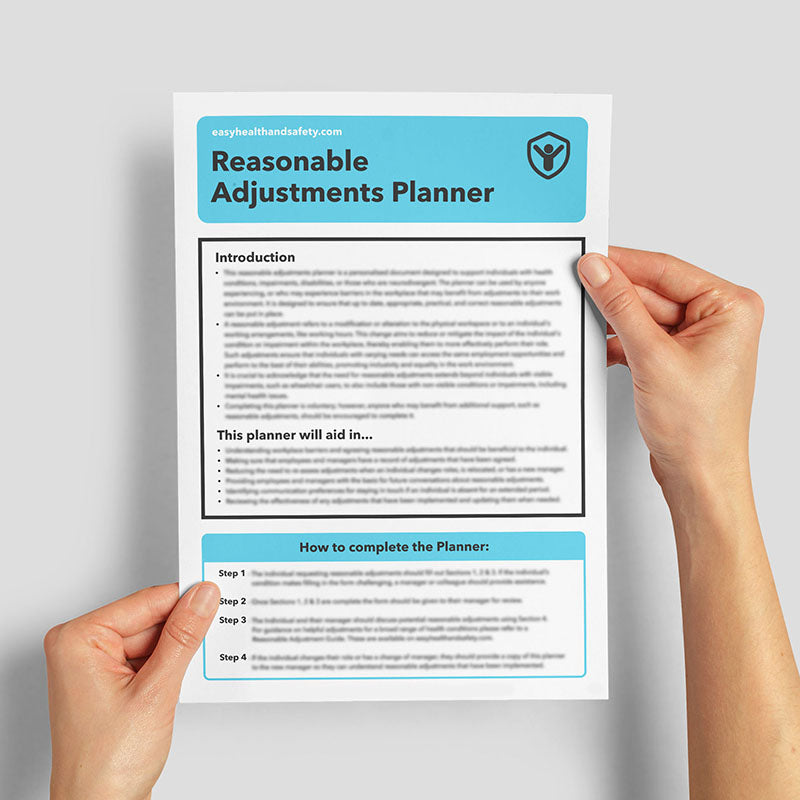
Reasonable Adjustments Planner
View ProductThe Reasonable Adjustments Planner empowers individuals with health conditions, impairments, and those who are neurodivergent by guiding them and their managers through the identification and implementation of appropriate workplace adjustments. It provides a clear path for understanding which adjustments are necessary for the individual and assists in facilitating their deployment.
-
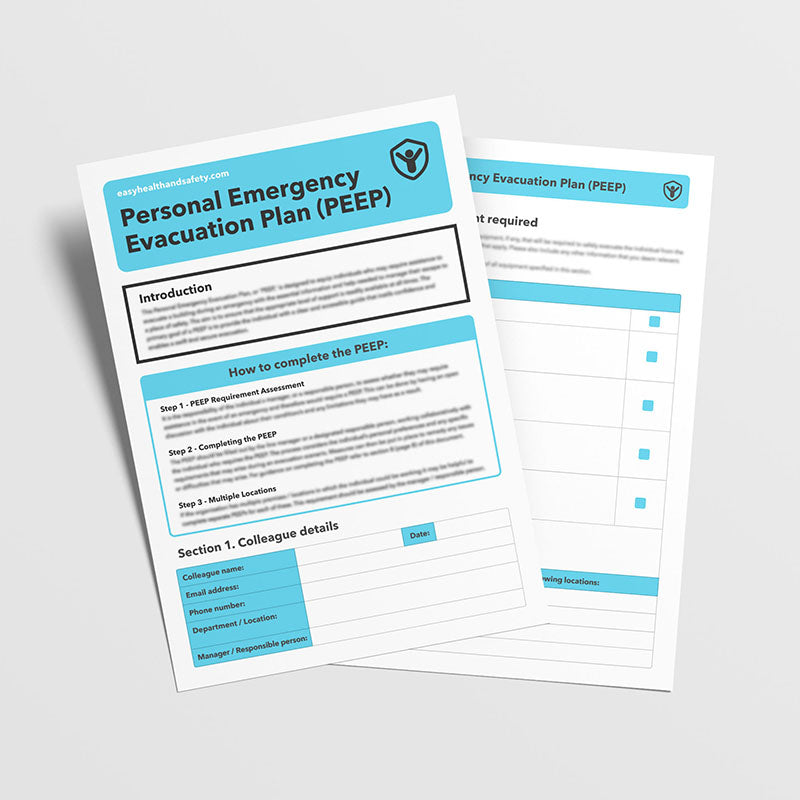
Personal Emergency Evacuation Plan (PEEP)
View ProductThe PEEP is a personalised evacuation strategy document. It outlines the intended routes and methods of evacuation, taking into account an individual's limitations, such as cognitive, or physical impairments. The PEEP is designed to ensure that everyone, irrespective of their abilities, can evacuate to safety in an orderly and timely manner, with the right support and resources at hand.
-
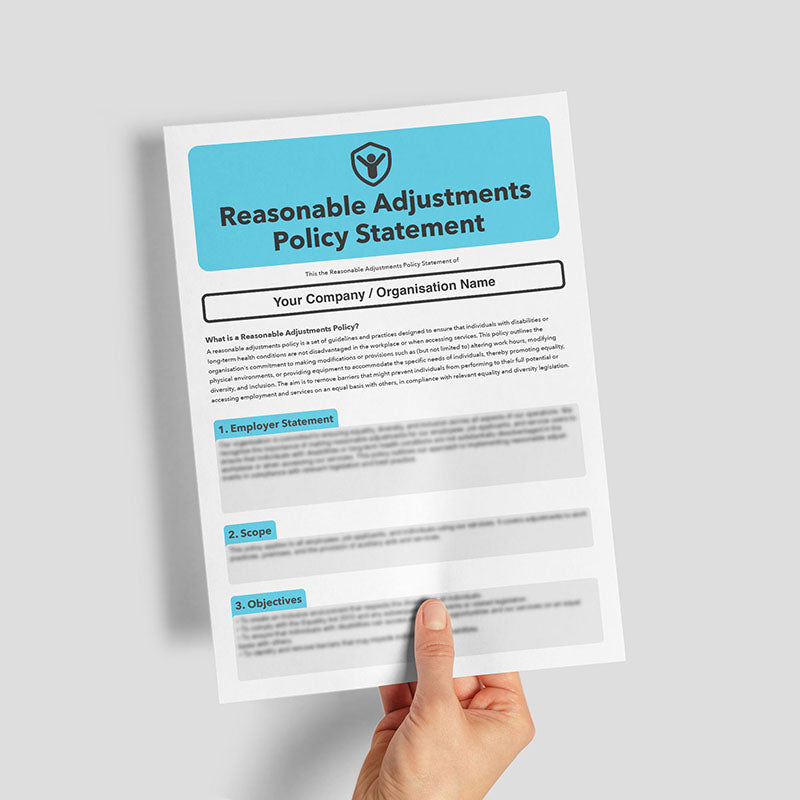
Reasonable Adjustments Policy
View ProductOur Reasonable Adjustments Policy is an essential asset for organisations striving to cultivate an inclusive environment. It provides a clear framework for how reasonable adjustments will be handled in the workplace. The aim being to provide consistency in eliminating workplace barriers across an organisation, enabling all individuals to access employment opportunities and services on an equal basis.

What are Reasonable Adjustments?
In today’s diverse working environments, understanding and implementing reasonable adjustments is essential for creating an inclusive atmosphere that supports employees with disabilities, health conditions, impairments, or neurodivergence. Reasonable adjustments refer to changes or modifications made in the workplace, or hybrid working space, to help employees overcome challenges and perform to their best ability.
The Benefits of Workplace Inclusivity
By embracing these adjustments, businesses not only adhere to legal obligations but also foster a culture of respect, diversity, and inclusion. This approach significantly benefits organisations by enhancing employee well-being, boosting productivity, and promoting a positive workplace environment.
Examples of Effective Adjustments
Examples of reasonable adjustments might include modifying workstations to be more ergonomic for individuals with physical impairments or allowing flexible working hours for those with chronic health conditions. Another example is providing specialised software or equipment to support employees who are neurodivergent or have specific sensory needs.
Learn more about implementing Reasonable Adjustments here

Why pay expensive consultant fees when you can manage reasonable adjustments yourself?
Benefits of Reasonable Adjustments...
-

Enhanced Inclusivity & Accessibility
Reasonable adjustments ensure that all employees, including those with disabilities, long-term health conditions, impairments, or neurodivergence, have equal access to employment opportunities and can perform their job roles effectively. This promotes a culture of inclusivity and accessibility, making the workplace more welcoming and supportive for everyone.
-

Increased Productivity and Employee Engagement
By accommodating the specific needs of candidates and employees, reasonable adjustments can lead to increased job satisfaction and morale. Employees who feel supported are more likely to be engaged and productive, contributing positively to the overall output and efficiency of the business or organisation.
-

Compliance with Legal Obligations
Implementing reasonable adjustments is a key aspect of complying with disability discrimination laws and regulations, such as the Equality Act 2010. This not only helps avoid potential legal issues but also demonstrates an organisation's commitment to fairness and equality, enhancing its reputation among both current and prospective employees.
Featured Product
Reasonable Adjustments Complete Bundle
This bundle saves you 70% compared to purchasing separate products. It includes a Reasonable Adjustments Planner, a Reasonable Adjustments Policy, a Personal Emergency Evacuation Plan (PEEP) and 46 Reasonable Adjustment Guides for a variety of health conditions. The Complete Bundle equips businesses keen on creating an inclusive environment with the necessary tools to support and assist individuals facing barriers in the workplace.

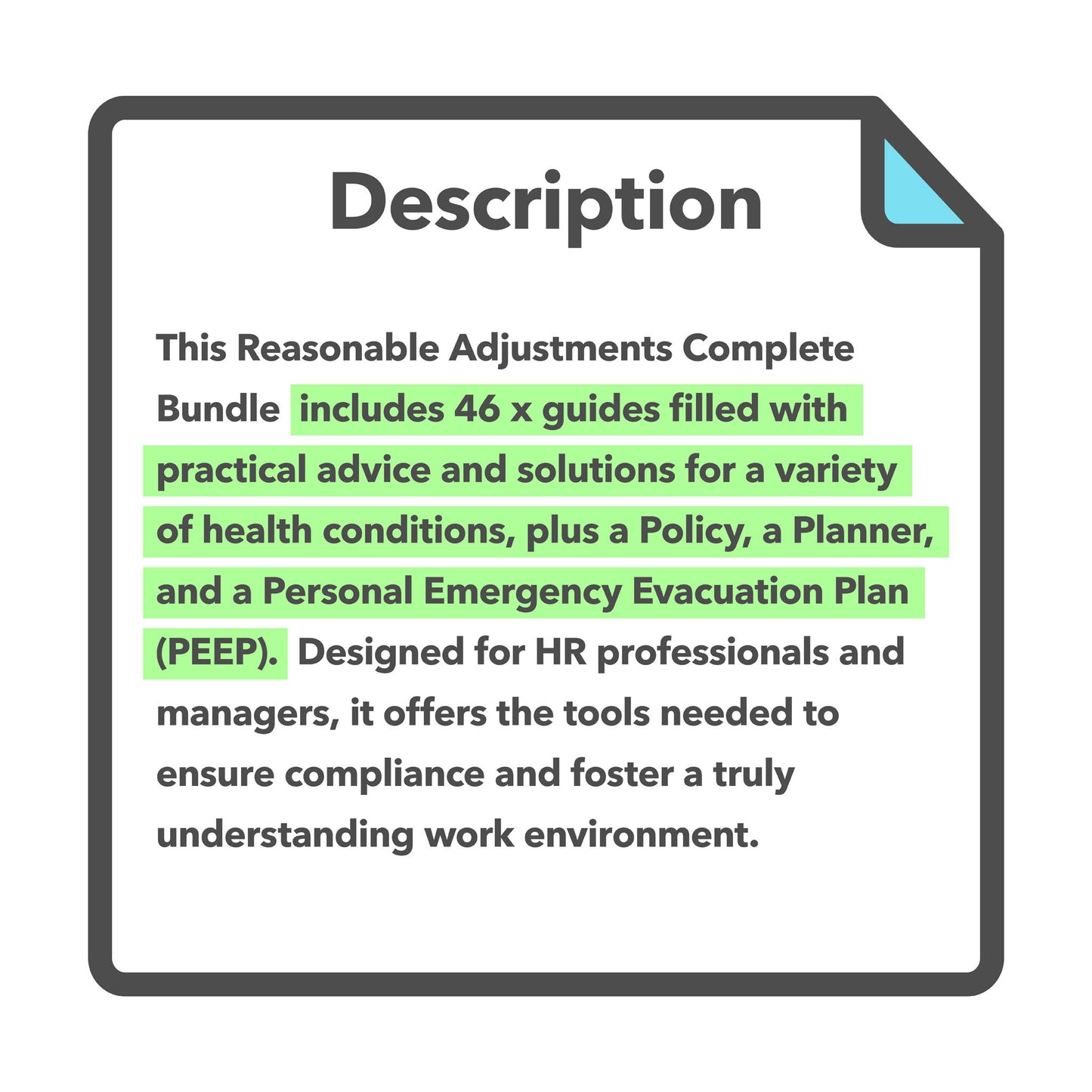
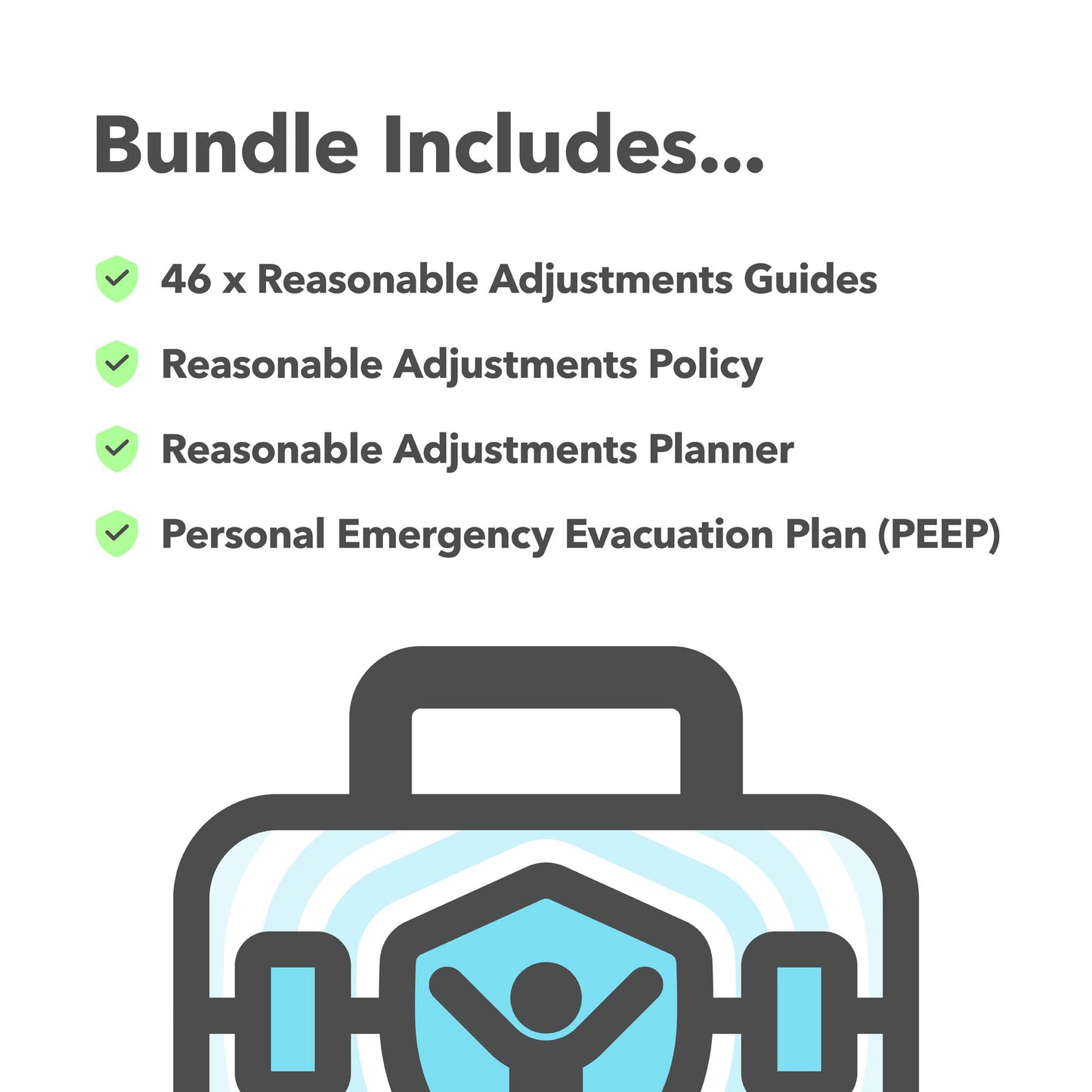
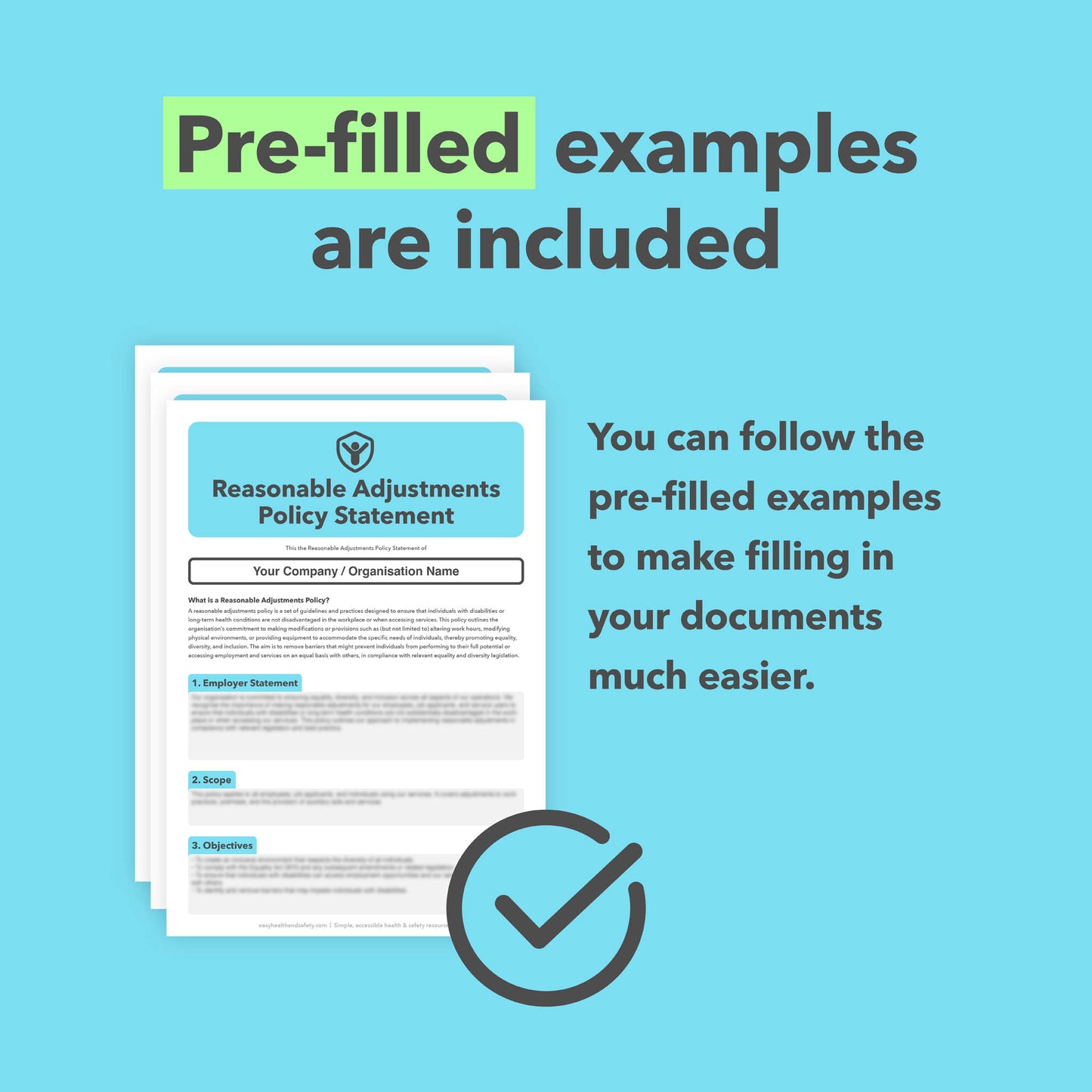
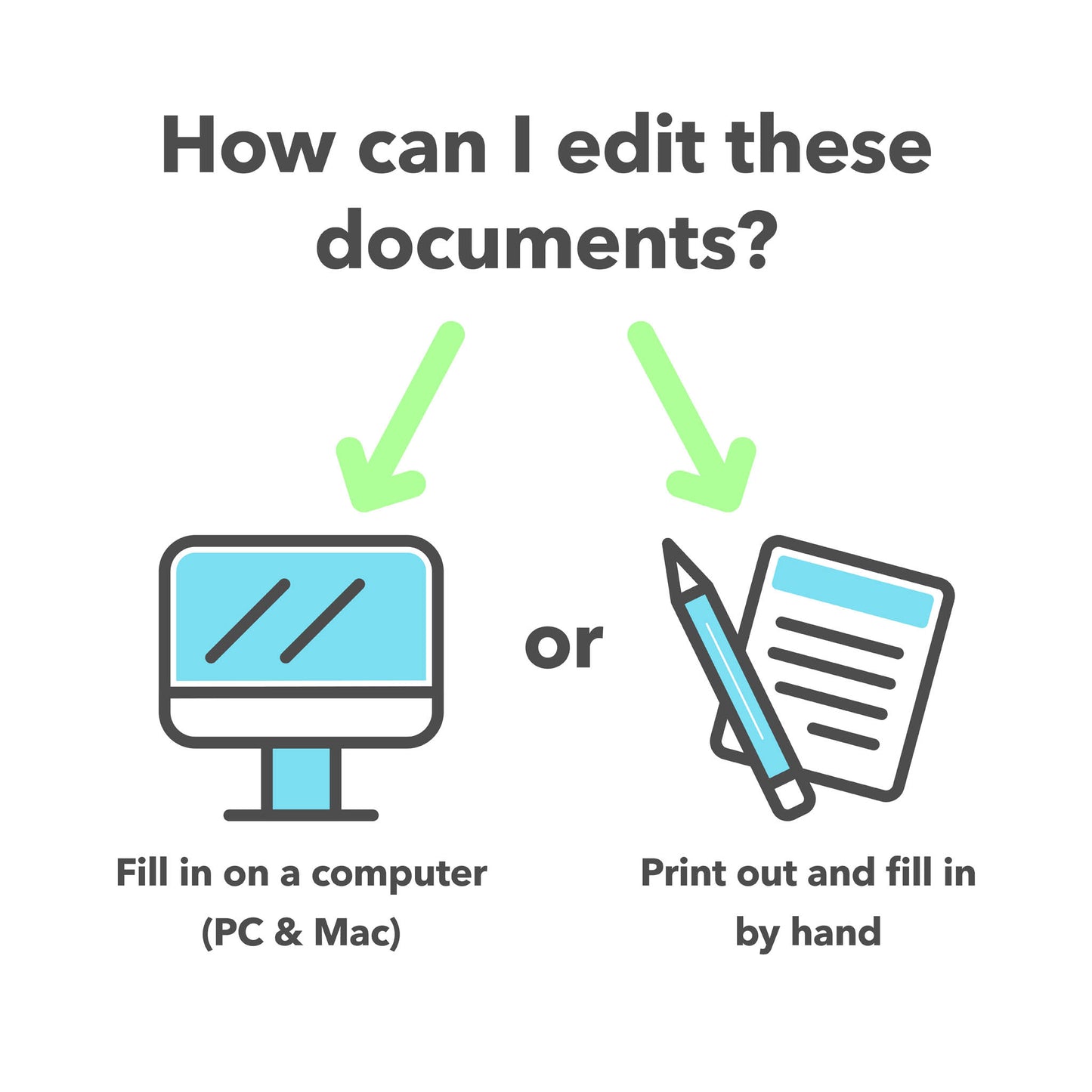




Empower Individuals. Strengthen your Business.
Foster an Inclusive Workplace Environment:
Reasonable adjustment products support the creation of a workplace that accommodates the needs of all employees, especially those with disabilities, health conditions, impairments, or neurodivergence. By doing so, the business promotes equality, diversity, and inclusion.
Improve Employee Well-being and Satisfaction:
Our product range can lead to better support for individual employee needs, which in turn can improve their overall well-being, job satisfaction, and morale. Happy and supported employees are more likely to be loyal and productive.
Enhance Compliance with Legislation:
Using these products helps ensure that a business complies with relevant laws and regulations concerning workplace adjustments for disabled employees, such as the Equality Act 2010. This reduces the risk of legal challenges and reinforces the company's reputation as a fair and equitable employer.
Boost Productivity and Efficiency:
By making the necessary adjustments, employees are better equipped to perform their duties effectively. This can lead to improved productivity and efficiency within the team or organisation, contributing to better outcomes and success.
Attract and Retain Talent:
Demonstrating a commitment to diversity and inclusion through the implementation of reasonable adjustments can make an organisation more attractive to potential employees. It can also enhance retention rates by showing current employees that their employer values their contribution and well-being.
Reduce Costs Associated with Absenteeism and Turnover:
By addressing the specific needs of employees through reasonable adjustments, businesses can reduce the costs associated with absenteeism and employee turnover. Supported employees are more likely to remain with the company and maintain regular attendance.
Overall, having a range of reasonable adjustment products equips businesses with the tools necessary to create a supportive, productive, and legally compliant workplace, benefitting both the organisation and its employees.
Frequently Asked Questions
Reasonable Adjustments at Work – FAQs for Employers and Employees
What are reasonable adjustments in the workplace?
Reasonable adjustments in the workplace are changes or modifications made to an employee's job role, work environment, or the way tasks are typically completed to accommodate employees with disabilities, long-term health conditions, impairments, or neurodivergence, ensuring they can work effectively and safely.
Who is entitled to reasonable adjustments?
Any employee or job applicant with a disability or long-term health condition that affects their ability to perform their job is entitled to reasonable adjustments under the Equality Act 2010.
What are some examples of reasonable adjustments?
Examples can include providing special equipment, modifying work schedules, allowing remote work, changing the physical layout of the workplace, or offering additional training and support.
How do I request reasonable adjustments at work?
Employees should inform their employer about their condition and discuss potential adjustments. The request can be made verbally or in writing, though it's often helpful to have a written record.
Is there a limit to what adjustments should be made?
Adjustments must be "reasonable," which considers factors like the effectiveness of the adjustment in alleviating disadvantage, its practicality, the cost, and the size and resources of the employer. There's no one-size-fits-all answer, as what's reasonable will vary between organisations and situations.
Who pays for reasonable adjustments in the workplace?
The employer is responsible for covering the cost of reasonable adjustments. In some cases, funding support may be available through schemes like Access to Work.
Can an employer refuse to make reasonable adjustments?
Employers can only refuse to make adjustments if they can show that the adjustments are not reasonable in the specific circumstances, considering factors like cost, practicality, and the business's resources.
What can I do if my employer refuses to make reasonable adjustments?
If you believe your employer has unreasonably refused to make adjustments, you can seek advice from organisations like ACAS, a Citizens Advice Bureau, or a legal professional. You may also have the option to make a claim to an Employment Tribunal if necessary.






